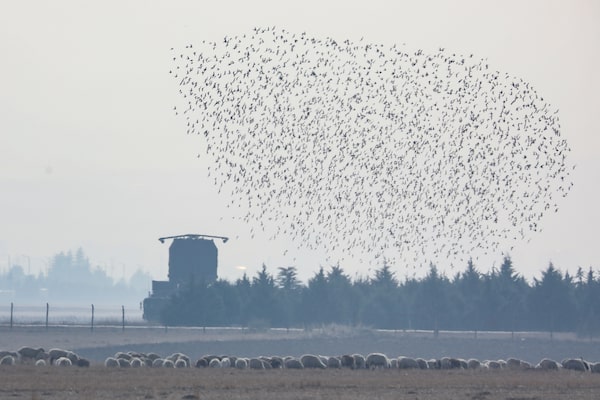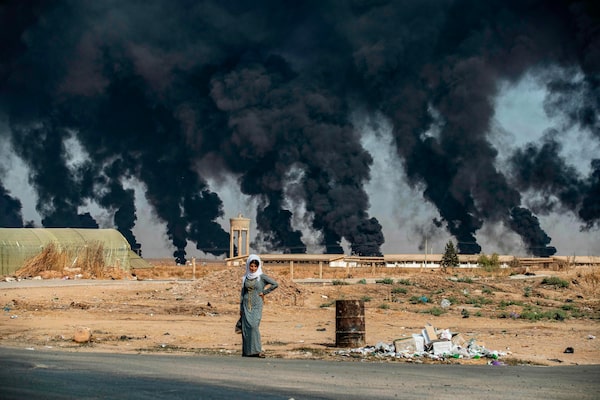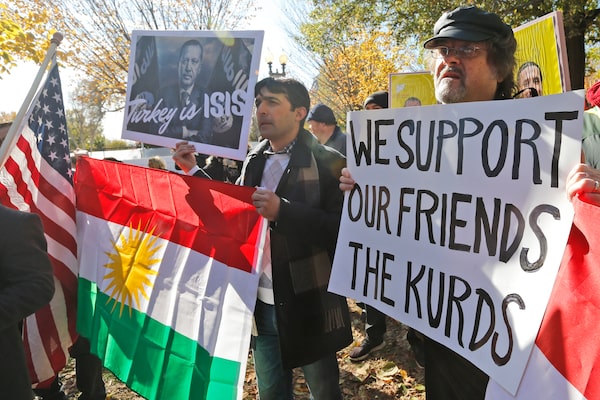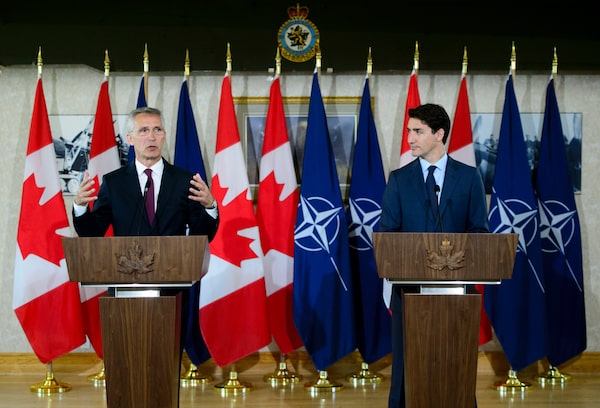
The Associated Press, AFP/Getty Images, The Canadian Press
What was supposed to be a demonstration of solidarity – a gathering of NATO leaders to mark the organization’s 70th anniversary Tuesday in London – is instead more likely to showcase the growing splits within the military alliance that won the Cold War.
NATO’s unity, already cracked by three years of U.S. President Donald Trump’s disdain for the alliance, has been further challenged in recent months by an increasingly rogue Turkey, as well as by French President Emmanuel Macron’s assertion that the 29-member group is “experiencing brain death” and is unable to meet the challenges it now faces.
Mr. Macron and Turkish President Recep Tayyip Erdogan carried out a long-distance exchange of words in the run-up to the London summit, with Mr. Macron criticizing the Turkish military’s offensive in northeastern Syria and Mr. Erdogan retorting that the French leader had a “sick and shallow” understanding of the alliance. “I’m addressing Mr. Macron from Turkey and I will say it at NATO: You should check whether you are brain dead first,” Mr. Erdogan said Friday.
German Chancellor Angela Merkel was also critical of Mr. Macron, reportedly accusing him of “disruptive politics,” even though she agrees that the alliance needs new ideas.
Watching from afar – and almost certainly enjoying the spectacle – is Vladimir Putin’s Russia, which has strengthened its military ties with Turkey, selling it advanced S-400 air defence systems in defiance of warnings from Washington. Last week, Turkey provocatively tested the systems by having them track American-made F-16 fighter jets of the Turkish Air Force as they flew over Ankara.

Birds fly and sheep graze near the Turkish Air Force's Murdet Air Base, near Ankara, on Nov. 25 as an S-400 air defence system from Russia is activated for testing.Getty Images/Getty Images
“This is obviously a challenging time for NATO. [The meeting in London] is an opportunity where members can come together – or the result could be yet more conflict,” said Marcel Dirsus, a fellow at the Institute for Security Policy at Kiel University in Germany.
“You obviously have a lot of different ideas of how to bridge those divides – and you have the uncertainty that comes with having Donald Trump at the table.”
Mr. Trump has unnerved many in the alliance by repeatedly describing NATO as obsolete while simultaneously appearing to court Mr. Putin. The U.S. President has also harshly criticized Germany and other members for not meeting NATO’s target of spending at least 2 per cent of gross domestic product on defence. (Canada, which spends about 1.3 per cent of its GDP on its military, is one of the 22 member states below the guideline.)
The Turkish military’s recent thrust into northeastern Syria – which is aimed at clearing out a Kurdish militia that Ankara sees as a terrorist group – is the most recent cause of dissension within the alliance. The military offensive began after an Oct. 9 phone call between Mr. Trump and Mr. Erdogan and was paused after consultations between Mr. Erdogan and Mr. Putin, who also has forces in Syria to support the regime of Bashar al-Assad.
NATO’s other members were left watching from the sidelines.

Tires set on fire to hamper visibility for Turkish warplanes burn behind a woman on the roadside in Tal Tamr, near the Syrian Kurdish town of Ras al-Ain, along the border with Turkey, on Oct. 16. The deadly cross-border Turkish offensive against Syria's Kurdish forces has sparked an international outcry.

Syrians throw stones at Turkish military vehicles during a Turkish-Russian patrol near the Syrian town of Darbasiyah. Ankara and Moscow agreed to the joint patrols under a deal to halt the offensive against Syrian Kurdish fighters.DELIL SOULEIMAN/Photos: DELIL SOULEIMAN/AFP via Getty Images
France, which has several hundred special-forces troops deployed alongside the Kurds as part of an anti-Islamic State coalition, was caught off guard by the rapidly changing events. “You can’t say on the one hand that we’re allies and insist on solidarity, and on the other present your allies with the fait accompli of a military intervention which endangers operations against ISIS by the coalition of which NATO is a member,” Mr. Macron said last week. In an interview last month with The Economist magazine, Mr. Macron said the Turkish incursion into Syria called into question NATO’s core principle of collective defence, which is covered by Article 5 of the alliance’s founding treaty.
Mr. Macron further rattled some members of the alliance – particularly in Eastern Europe – by saying in the same interview that it was time to revisit relations with Moscow, which have been in a deep freeze since Russia seized and annexed the Crimean Peninsula from Ukraine in 2014. Mr. Macron has invited Mr. Putin and Ukrainian President Volodymyr Zelensky to Paris on Dec. 9 for peace talks.
France and Germany came together to ban the export of weapons to Turkey over the Syria operation, the first time such a step has been taken against a fellow NATO member. Canada followed suit on Oct. 15 by announcing it was temporarily suspending new weapons sales to Turkey.
But agreement between Paris and Berlin fell apart over Mr. Macron’s subsequent comments to The Economist.
“I understand your desire for disruptive politics,” Ms. Merkel told Mr. Macron at a dinner last month to celebrate the 30th anniversary of the fall of the Berlin Wall, in a conversation reported by The New York Times. “But I’m tired of picking up the pieces. Over and over, I have to glue together the cups you have broken so that we can then sit down and have a cup of tea together.”
Mr. Macron reportedly replied: “I cannot sit there and act like nothing has happened.”
German Chancellor Angela Merkel and French President Emmanuel Macron attend a news conference after an October joint cabinet meeting in Toulouse.Regis Duvignau/Reuters
Mr. Dirsus said Ms. Merkel agreed with Mr. Macron’s assessment that, with the U.S. having become an unpredictable ally under Mr. Trump, European states need to think more about their own defence. But rather than questioning NATO’s relevance, Germany preferred to see European states build up their capacities within the alliance.
To that end, Ms. Merkel announced this week that Germany would increase military spending to meet NATO’s 2-per-cent target “by the early 2030s.” Germany has also called for the creation of a commission, to be chaired by NATO secretary general Jens Stoltenberg, that would look at ways to improve political co-ordination among members of the alliance.
But the tensions keep growing.
Reuters reported last week that Turkey intends to raise the stakes in London by refusing to sign off on a new NATO plan for the collective defence of Eastern Europe – a document that requires the signatures of all 29 member states – unless the rest of the alliance backs Ankara’s stand on Syria.
The NATO plan would see members agree to rapidly deploy forces to Poland, as well as the Baltic states of Lithuania, Latvia and Estonia, in the event of any further Russian aggression.
Turkish Foreign Affairs Minister Mevlut Cavusoglu said his country’s concerns were just as valid as those of the Eastern European countries. “What is requested for the Baltic should also be requested for Turkey,” he said Thursday.

Pro-Kurdish demonstrators protest against Turkish President Recep Tayyip Erdogan in Washington on Nov. 13.Steve Helber/The Associated Press
Ankara’s military actions against the Syrian Kurds – which caused a refugee exodus and led to the escape of hundreds of Islamic State prisoners being held by the Kurdish forces – has led to bipartisan calls in the U.S. Senate for Turkey’s NATO membership to be suspended.
But there’s no clause in the alliance treaty that allows for the suspension or expulsion of a member, and military analysts say such a move would be unlikely even if it were possible. Turkey, which is strategically located between Europe, Russia and the Middle East, is simply too valuable to the alliance, fielding NATO’s second-largest army (after that of the U.S.) and hosting the massive Incirlik Air Base.

Prime Minister Justin Trudeau holds a joint news conference with NATO secretary general Jens Stoltenberg at CFB Petawawa in July.Sean Kilpatrick/The Canadian Press
The infighting leaves Canada in an awkward position. Prime Minister Justin Trudeau will arrive in London – days before his new minority government delivers its Throne Speech to the House of Commons – worried about the growing divisions between the U.S. and Europe.
But while Mr. Trudeau spoke up in defence of NATO after Mr. Macron’s interview with The Economist, he will likely try to steer clear of the fray in London.
“Canada can definitely reaffirm its commitment to NATO and emphasize the various contributions it’s making,” said Stéfanie von Hlatky, an associate professor of political studies at Queen’s University, where she is a fellow at the Centre for International and Defence Policy. Mr. Trudeau, she added, “will probably be very prudent when it comes to taking sides in what has become a very public disagreement.”
Our Morning Update and Evening Update newsletters are written by Globe editors, giving you a concise summary of the day’s most important headlines. Sign up today.
 Mark MacKinnon
Mark MacKinnon